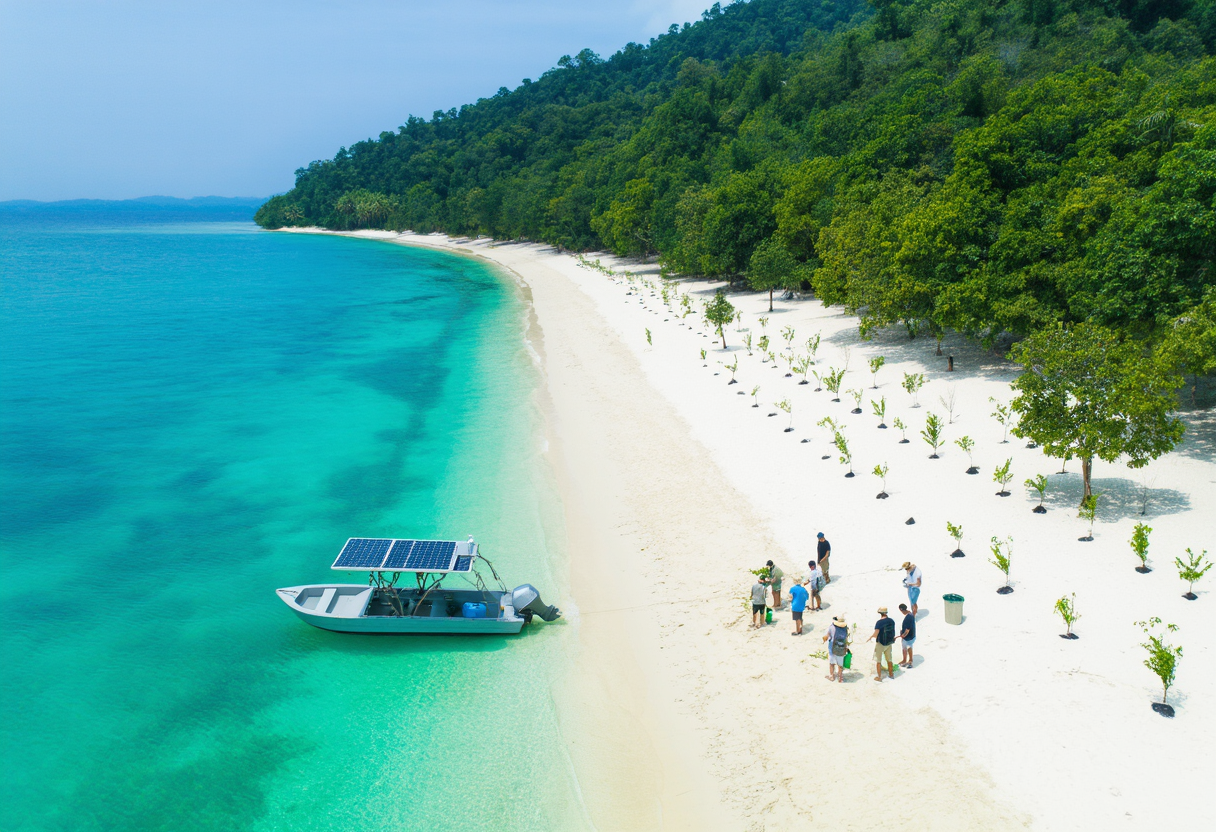The Future of Island Tourism: Embracing Sustainability and Innovation
Island tourism is evolving rapidly, driven by the increasing demand for sustainable practices and innovative experiences. As destinations adapt to environmental concerns, travelers seek out eco-friendly options that preserve the natural beauty of islands. This article explores how sustainability and technology are intertwining to shape the future of island tourism, ensuring enjoyment without compromising ecological integrity.
Sustainability: The Cornerstone of Island Tourism
The concept of sustainability is becoming integral to island tourism. Tourists today are increasingly conscious of their environmental impact, leading island destinations to implement sustainable practices. This includes promoting local cultures, conservation of wildlife, and reducing carbon footprints. For instance, many resorts now utilize energy-efficient systems and waste reduction initiatives. The focus on sustainability in island tourism not only enhances the reputation of these destinations but also attracts a demographic eager for responsible travel experiences. In this context, island tourism must balance guest comfort with ecological responsibility. By aligning with sustainable practices, islands can offer unique experiences while protecting their environments for future generations. Moreover, local communities benefit from this shift, both economically and socially, through engage with visitors who value genuine interactions and cultural exchanges.
Innovation in Travel Experiences
Innovation plays a crucial role in redefining island tourism. From virtual reality tours to personalized travel itineraries powered by AI, technology enhances visitor experiences. Island tourism now leverages digital tools to create memorable adventures that go beyond traditional sightseeing. For example, augmented reality applications allow travelers to explore historical sights in interactive ways. Similarly, innovative transportation solutions such as electric boats available for island hopping are gaining traction. Such advancements are essential for meeting the ever-changing preferences of travelers. As a result, the integration of technology in island tourism not only improves visitor satisfaction but also positions islands as forward-thinking destinations of choice. Therefore, enhancing the travel experience through innovation is vital for the competitiveness of islands within the tourism market.
Marketing Strategies for Modern Island Tourism
Marketing strategies in island tourism require a modern approach that resonates with today's travelers. Social media platforms are key channels for promoting unique island experiences. Engaging content such as stunning photographs, traveler testimonials, and live updates can entice potential visitors. Island tourism boards must adopt authentic storytelling methods to convey their destination's narrative, which fosters a personal connection with audiences. Furthermore, collaborating with influencers who share the values of sustainable travel can amplify outreach and credibility. Additionally, respondents can attract families, adventure seekers, or luxury travelers by offering specialized packages. Adapting marketing strategies to focus on community involvement and eco-friendly practices can significantly influence public perceptions of a destination. As competition in the tourism sector heats up, these compelling marketing approaches will be essential for islands striving to capture visitor interest.
The Role of Local Communities in Island Tourism
Local communities play a pivotal role in enhancing the appeal of island tourism. Engaging residents in tourism initiatives fosters a sense of ownership and pride in their cultural heritage. Many islands embrace community-led projects that enhance visitor experiences while ensuring that economic benefits reach local hands. By promoting local crafts, cuisine, and traditions, these initiatives create authentic encounters for travelers. This not only enriches the overall experience but also ensures that the cultural identity of the islands remains intact. Moreover, developing partnerships between local businesses and tourism providers strengthens the economic fabric of the community. Sustainable employment opportunities arise from such collaborations, making local involvement essential. Consequently, empowering communities transforms the landscape of island tourism, resulting in sustainable growth that benefits all stakeholders.
Challenges Facing Island Tourism
Despite its many advantages, island tourism comes with challenges that must be addressed. Climate change poses a significant threat, with rising sea levels and increased weather variability affecting island ecosystems. Furthermore, over-tourism can lead to environmental degradation and the dilution of cultural heritage. It is crucial for island destinations to manage tourist influxes responsibly, ensuring resource availability for both visitors and residents. Implementing capacity limits and diversifying tourism offerings can help alleviate the pressure of visitor numbers. Additionally, proactive dialogue with stakeholders can foster cooperative strategies to tackle these issues collectively. Education campaigns aimed at raising awareness among tourists about sustainable practices can encourage responsible behavior. Therefore, recognizing and addressing these challenges is vital for the long-term viability of island tourism.
Conclusion: The Evolving Landscape of Island Tourism
Island tourism is poised for a transformative journey, where sustainability and innovation are at the forefront. As awareness of environmental issues grows, both travelers and destinations are rallying around preserving island paradises. Through embracing sustainable practices and leveraging innovative technologies, the future of island tourism looks promising. Local communities play a significant role in this evolution, enhancing travelers’ experiences while safeguarding cultural heritages. As challenges arise, proactive responses will ensure that islands remain vibrant and welcoming destinations for generations. The commitment to blend ecological consciousness with modern travel experiences will be paramount to thriving within the competitive tourism landscape.
